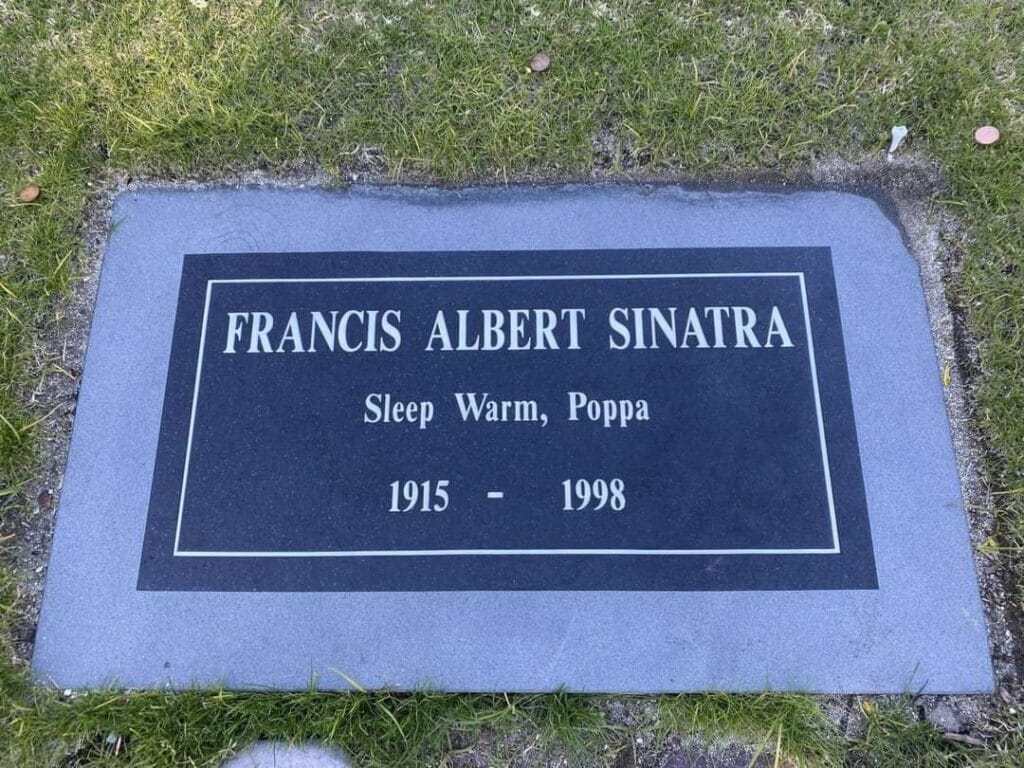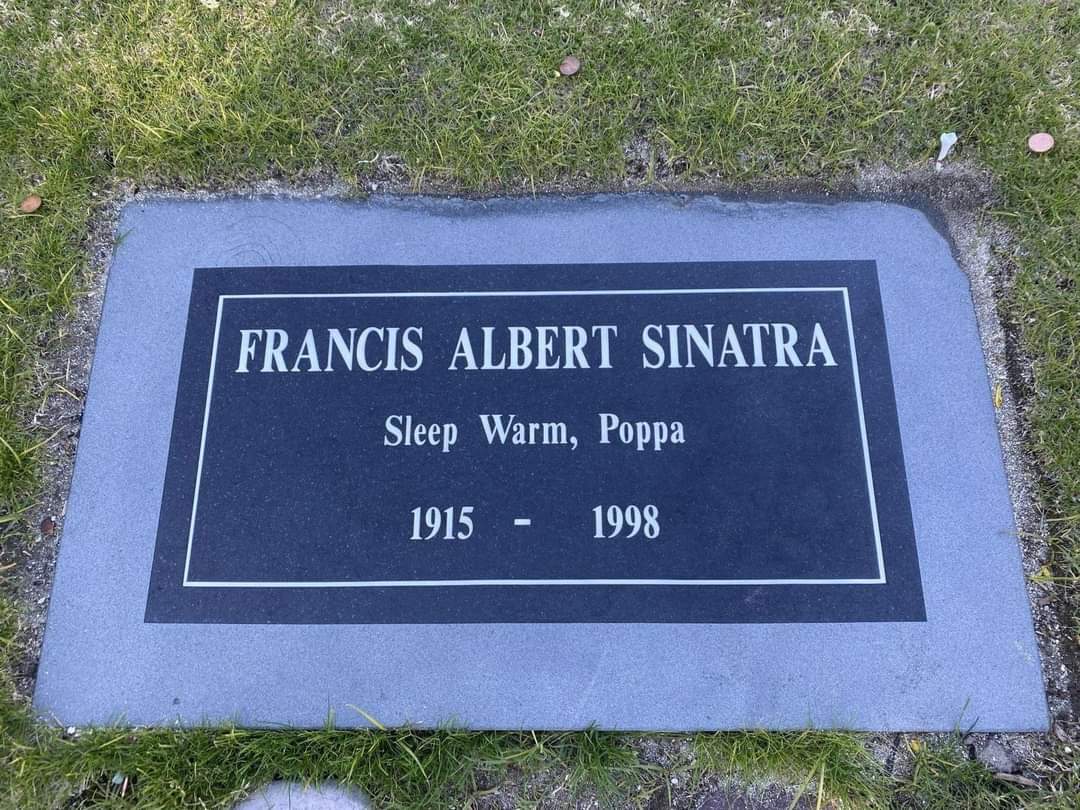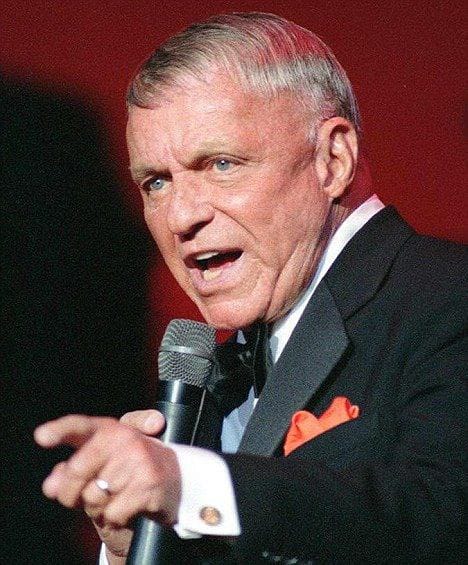
The Last Years of Frank Sinatra
Episode 18 and Last.
While Frank’s life fades away, his children remain oblivious to the tragic event; No one has called them, there are those who claim that it was by Barbara’s order, although she will say in her autobiography that everything happened so quickly that she could not react. Dr. Rex Kennamer calls Tina Sinatra at 11:10 p.m. and is unable to explain why the family has not been notified. Tony Oppedisano tries to calm the waters by saying that Susan Reynolds, the artist’s public relations manager, had been very busy keeping the press from finding out.
Tina gets into her car and drives wildly towards Nancy’s house, running red lights and almost colliding with another vehicle. When they arrive at the hospital, Dr. Kennamer takes them to their father’s deathbed. Frank’s face expresses serenity. Despite the deterioration, his inert figure still transmits the aura of power that characterized him in life.
“My father was the strongest and bravest man I have ever known.” –Tina will say in her book “My Father’s Daughter”, published in 2000– “He seemed indestructible to me; He was not one to give up. I think he was ready to leave. I was very tired, alone and broken. His soul had died years before his tenacious body. His future held only pain. He could never be at peace, he never stopped running until the end. My father didn’t die. “He escaped.”
Tina and Nancy cry uncontrollably clinging to Frank’s still warm body and pray for his soul. When their gazes meet Barbara’s, the struggle to contain their emotions is titanic. The most important women in Sinatra’s life offer each other polite condolences, but there is not a single gesture of affection.
From the hospital, Nancy and Tina head to the Foothill mansion, where a large group of Frank’s friends have gathered. Tina feels the need to spend a moment alone in her father’s room and takes with her what was his favorite robe as a souvenir, a beautiful black and white cashmere piece that maintains Frank’s characteristic smell. Outside the house, a good number of journalists gather with the intention of obtaining photos and statements. In a few hours, the world will wake up to the news of the physical disappearance of Francis Albert Sinatra.
The always blinding lights of Las Vegas dim their intensity, and the casinos stop their frenetic roar for a minute. The Empire State is dyed blue light in memory of those legendary eyes. The Capitol tower goes dark. Sinatra’s songs fill the radio stations, and on television his image colonizes the programming grids. Blue cocktails are served in bars all over the world.
At noon on Friday the 15th, the Sinatra family meets in Foothill to organize the funeral. During the night, a respectful crowd had been approaching the area around the house. Large floral arrangements line the vehicle passage and the main door. A rosary is scheduled for Tuesday the 18th and the funeral for the following day, at the Church of the Good Shepherd in Beverly Hills. To avoid the press following them to the funeral home, Nancy and Tina have to travel on the floor of the car covered with a coat. Mia Farrow, Frank’s third wife is there with the family. Everyone has brought some of Frank’s favorite things to accompany him in the coffin: cherry Life Savers candies and chocolate Tootsie Rolls, which he ate since childhood, a miniature bottle of Jack Daniel’s whiskey, a pack of Camel cigarettes and a Zippo lighter. Barbara puts a gold Bulgari medallion that she had given him for one of his birthdays in one of her husband’s pockets. His granddaughters add some stuffed animals, and Tina contributes a dog cookie, because of Frank’s love for animals. The deceased is elegantly dressed in a midnight blue suit with fine pinstripes, white shirt and pink tie with blue prints.
Until a couple of days before the funeral, the war within the Sinatras continues. Frank’s children are informed of the existence of their father’s second will, in which Frank bequeaths Barbara an additional three and a half million dollars from his share of the joint property. Tina suspects that Barbara had access to the first will and would have participated in that change. There is also a bitter discussion about the advisability of holding a military funeral, previously authorized by President Bill Clinton. The idea excites the singer’s children, but the widow and her lawyer decline the offer, arguing that Frank had not served in the army and the ceremony would have embarrassed the artist. Finally, shortly before the funeral, an agreement will be reached and an American flag will be given to the widow, symbolizing the one that covers the coffins of the deceased in military funeral honors. In a gesture of conciliation with the Sinatra family, Barbara will hand the flag to Frank Jr.
Some of Frank’s songs are played in the rosary (including “In The Wee Small Hours Of The Morning” and “Moonlight In Vermont”), performed by pianist Bill Miller and guitarist Al Viola, who were faithful for so many years. Sinatra’s companions in the studio and at concerts. On the altar, next to the coffin, you can see the portrait of Frank painted by Paul Clemens and which appeared on the cover of the compilation “Everything Happens To Me” in 1996. During the ceremony Nancy Sinatra and her two daughters speak, reading a poem by Edward Estlin Cummings and the essay about tolerance written by Frank himself in 1991.
At the conclusion of the ceremony, Tina gives the mortician a small white envelope to leave on the coffin. In the envelope is a card and some dimes, which Frank always carried with him in case he had to make a phone call.
The next day dawns clear and bright. An airplane draws the letters “FS” inside a heart with white smoke in the sky. The parade of celebrities invited to the event is a feast for the press and the curious who crowd around the temple. Present are Gregory Peck, Steve Lawrence, Eydie Gorme, Don Rickles, Tony Bennet, Milton Berle, Ernest Borgnine, Kirk Douglas, Quincy Jones, Liza Minnelli, Tony Curtis, Mia Farrow, Anthony Quinn, Sidney Poitier, Larry King, Bob Dylan and a very long etcetera. The sun shines through the stained glass windows of the church, bathing the space with a comforting light and the air is scented with the fragrance of hundreds of white roses, lilacs and gardenias. The religious service extends beyond two hours and concludes with the choir singing “Ave Maria.”
When the last notes of Schubert’s work still float in the air, a string arrangement makes the mourners tremble with emotion: it is a recording of “Put Your Dreams Away”, the song that served as an emblem for Frank during the early years of his career.
“Put your dreams one more day and I will take their place in your heart…”
Some close friends of Frank go up to the altar to share their memories and anecdotes, and the laughter momentarily breaks the prevailing sadness. Frank Jr., who had been absent – for professional reasons – during his father’s agony, dedicated the warmest and most honest speech, without needing to rely on writing.
Frank’s mortal remains are transported to be buried in Palm Springs, on a plane provided by tycoon Kirk Kerkorian. Burial takes place at Desert Memorial Park and is reserved for the family. The place remains cordoned off and hidden under tents in order to maintain the privacy of the moment. Frank had chosen a very simple and accessible grave, next to those of his parents and his dear friend Jilly Rizzo. His tombstone simply shows his name, the dates of his birth and death, and the inscription “The Best Is Yet To Come. Francis Albert Sinatra. Beloved Husband and Father” (“The best is yet to come. Francis Albert Sinatra. Beloved husband and father”) (1)
EPILOGUE
For the general public, the figure of Frank Sinatra is synonymous with artistic greatness, unprecedented success and an influence that surpasses the limits of his profession. The timeless beauty of his songs, the exuberance of the women who passed through his bed and his closeness to power have inspired the work of writers, filmmakers and journalists, strengthening this indestructible icon in the collective consciousness in the face of the sociocultural changes that followed. dizzying speed during the sixty years that his career lasted.
A more exhaustive reading reveals that not everything was toast. Frank Sinatra had to face a series of personal challenges that were decisive in the forging of his personality. He suffered a childhood marked by loneliness and ethnic prejudice (shared with the vast majority of the Italian-American community at the dawn of the 20th century) and as an adult it was impossible for him to find sentimental roots and adequately exercise his fatherhood. Professional glory couldn’t ease the pain of his personal frustrations, and that translated into visceral behavior, for better and worse. His outbursts of anger when something outraged him, his merciless treatment of someone he considered a traitor, and his gestures of astonishing generosity towards anyone who needed his help are famous.
Somehow each struggle and contradiction contributed something to Sinatra’s complex and irresistible character.
For all of the above, discussing the final and arduous years of the Voice may be anticlimactic for many, since its decline was rapid and painful. But I firmly believe that the story should be disseminated because it humanizes the idol and, consequently, magnifies his achievements and weakens his faults.
GRADES
(1) At the end of 2020 the tombstone was changed for another one with an even more austere design, in black and with a different inscription: “Sleep Warm, poppa” (“Sleep well, dad”), after the original was vandalized by someone who was especially cruel with the part where the word “husband” could be read. There are those who suggest that Frank’s daughters could be behind the incident.
Article written by Mahnuel Muñoz. (Al mal tiempo, Frank Sinatra) https://www.facebook.com/groups/120950148274703
If you want to visit more articles about the life of Frank Sinatra enter the following Sinatra Radio 24h link: https://sinatraradio24h.com/category/articles/
We remind you that you can also listen to Sinatra Radio 24 hours on your mobile phone by downloading our free applications for Android in the Play Store https://play.google.com/store/apps/details?id=sinatra.radio24h for iPhone in the Apple Store https://apps.apple.com/app/sinatra-radio-24h/id6599859344







